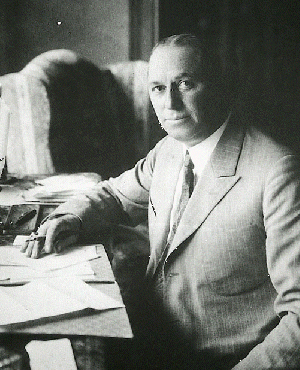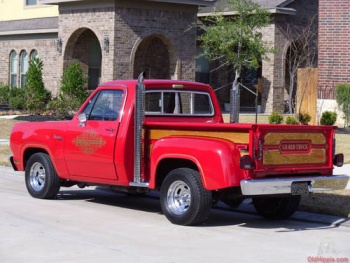Difference between revisions of "Template:FeaturedWiki"
| Line 21: | Line 21: | ||
|} | |} | ||
--> | --> | ||
| − | <-- | + | <!-- |
<!-- Feature #2 --> | <!-- Feature #2 --> | ||
{| style="background:#024B78;color:black;width:100%;" border="0" cellpadding="5" cellspacing="2" align="center" | {| style="background:#024B78;color:black;width:100%;" border="0" cellpadding="5" cellspacing="2" align="center" | ||
Revision as of 02:51, 27 March 2020
Walter P. Chrysler was a native of Kansas, and cut his teeth on railroading. He was the son of an engineer on the Kansas and Pacific Railroad, and was always fascinated by machinery. As a young man, he built his own working railroad model, machining his own tools in the process. When he was 17, he signed on at the Union Pacific shops as an apprentice, for a nickel an hour. Mechanical engineering became young Walt Chrysler's life, not his profession. After he got his journeyman's certificate, he took a job in the Rio Grande & Western roundhouse in Salt Lake City. He got married and began studying with the International Correspondence School. He steadily moved up through the industry. After a bit of time, the superintendent of motive power of the whole Chicago & Great Western system was a new man named Chrysler. "W.P." they called him. During his Great Western period Mr. Chrysler lived in Oelwein, Iowa. His mechanical curiosity was piqued by the new ‘horseless carriages’ he’d see traversing the town streets. He went to the 1905 Chicago automobile show, where he saw a beautiful auto that he had to have. It was called a ‘Locomobile’. The price was $5,000 cash. Chrysler had only $700 in the bank, but that did not hold him back. He borrowed $4,300 and shipped it home. He spent months with his first car, tearing it down and reassembling it several times before he even learned to drive it! Chrysler decided that when the time was right, he would need to improve these things. At 33, machinist/manager WP joined on with the American Locomotive Company, where he swiftly rose through the ranks. He was assigned to the position of Assistant Works Manager at the sprawling ALCO Pittsburgh plant, which he quickly transformed into a moneymaker. It was in this position that WP was first noticed by one of the directors of ALCO, James J. Storrow, who would soon the president of General Motors. James Storrow, the president of GM, remembered the young Chrysler, and introduced him to Charlie Nash, then the president of Buick. After touring the Buick works, Nash could offer WP only $6000 a year, half of WP’s $12000 a year ALCO salary. Chrysler did not even hesitate! He immediately accepted the Buick position. It was 1911, and Walter P. Chrysler was in the automobile business! Over the next few years, WP built Buick into a power to be reckoned with, with Nash at the helm. In 1916, however, William Crapo Durant used the power of his upstart Chevrolet Company to leverage the presidency of General Motors. Nash would not be welcome under Durant, and Nash and Chrysler were a team. Nash purchased another auto manufacturer, in Kenosha, Wisconsin, and created the Nash Motors Company, which would later become American Motors. It was assumed that Chrysler would join him at the helm of this new company. Read More |
-->
The Last American Hot Rod to roll off the assembly line in the late 1970s.78 Lil' Red Truck Dodge released the Lil' Red Express Truck In 1978 it was one of the most unique Dodge trucks that had ever been produced. The Lil' Red Express was not only a real looker but these trucks were also real performers also. In 1978 The Dodge Lil' Red Express was the fastest American made vehicle from 0 to 100 MPH as tested by Car and Driver magazine. Because of a loophole in the emissions regulations the 1978 Dodge Lil' Red Express Truck's did not have catalytic converters, what the Lil' Red Express did have was a special High Performance 360 C.I. 4-barrel small block engine code (EH1) which was a modified version of the 360 police engine (E58) producing 225 net horsepower @ 3800 RPM. The package also included Hemi style mufflers with a crossover pipe breathing through 2 chrome stacks located behind the cab, a special 727 transmission and 3.55:1 rear gearing. The 1978 Dodge Lil' Red Express Truck rode on GR60x15 raised white letter tires on 7-inch Chrome wheels up front and LR60x15 on 8-inch chrome wheels on the rear and there was no spare included. All 1978 Dodge Lil' Red Express Truck's were automatics the interiors were available with a standard bench seat in red or black or with optional buckets and a fold down arm/rest console which was available both years. 1978 and some early 1979 Dodge Lil' Red Express Truck's used the "tuff" steering With the success of the 1978 Dodge Lil' Red Express Truck production of the 1979 Dodge Lil' Red Express Truck's was increased to 5,118. Most of the features remained unchanged for 1979 however there was some changes which included a catalytic converter, unleaded gas, 85 MPH speedometer. Read More |

